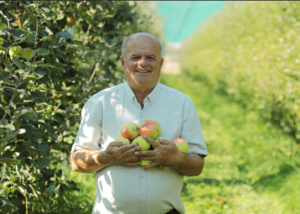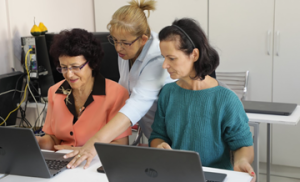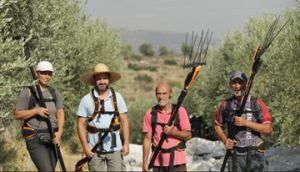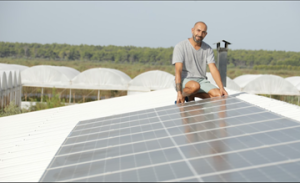
CoSolve-19 – An Impactful Corona Recovery Project
In the wake of the unprecedented challenges posed by the COVID-19 pandemic, Micro-, small- and medium-sized enterprises (MSMEs) and individual farmers in Albania found themselves teetering on the precipice of economic uncertainty. However, from the crucible of crisis, a remarkable initiative was born – the CoSOLVE-19 Project. The Advisory Facility for the COVID-19 Crisis Mitigation is a joint initiative by the Albanian and German Governments implemented by GIZ with the overarching goal of supporting MSMEs that are severely hit by the consequences of Corona crisis in Albania.
Throughout the implementation of the project, MSMEs were strengthened not only to cushion the current crisis but also to put their operations on more solid ground to adjust to the new situation and adapt new resilience measures to the forthcoming challenges in the future.
This comprehensive project aimed to offer support and sustainability to these businesses (with up to 10 employees), which constitute a staggering 95% of the Albanian economy and contribute up to 20% of the PBB. To understand more about the approach and the remarkable achievements, the management team interview gives us more insights into this transformative endeavor.
Let’s begin by exploring what inspired the CoSOLVE-19 project team, along with their Albanian partners, to develop this groundbreaking project?
The CoSOLVE-19 Project was inspired by the urgency of the Corona crisis and the pressing need to support the lifeblood of Albania’s economy: micro, small, and medium-sized enterprises (MSMEs) and individual farmers. As a development agency, they were called upon by the German and Albanian governments to formulate an emergency response, recognizing the vital role these enterprises play. MSMEs were hit hard by the pandemic, which found them extremely unprepared to swiftly adapt to the “new norm” and lacking digital tools most of all. There was a conspicuous absence of schemes tailored to their specific needs as well. Thus, a comprehensive package aimed at their empowerment and sustainability became imperative following a 3-step mechanism towards resilience. As such CoSOLVE-19 aimed at offering:
(1) Taylor made coaching and advisory services for the MSMEs and individual farmers.
(2) Guidance on access to finance
(3) Financial support to those businesses that are not eligible or capable of accessing other means of finance.
Which were the most pressing challenges that CoSOLVE-19 was faced with during the conceptualization phase, and how did the project team identify the needs of the targeted sectors?
Of course, the general goal of CoSOLVE-19 was to support the MSMEs and individual farmers severely affected by the consequences of the Corona crisis in Albania, first of all, to maintain employment and not increase it. Yet when you have such a big ambition, and look at the economic structure where these businesses comprise 95% of around 160’000 businesses in Albania, you see the need to narrow down the scope to the most affected areas. First, due to the slow economic recovery and rising unemployment, businesses in the tourism sector were the first target area identified. The agricultural sector was secondly identified, as a major sector that has also been negatively affected by the situation of Corona pandemic.
Agriculture is of great importance for Albania’s socio-economic development, as it contributes about 20% to the country’s GDP and represents 42% of total employment.
Regardless of these two sectors, tourism and agriculture, it must be said that commercial companies in all sectors have been affected by the effects of the crisis, we mention here retail trade, textiles, leather, services, etc. So, in this regard, it was relatively easy at least to identify the scope of the CoSOLVE-19 Project.
How was the launching of the call and the selection/evaluation process?
The selection and evaluation process for the CoSOLVE-19 Project was not without its challenges. One notable issue was the number and diversity of participants. This diversity not only highlighted the complexity of the situation but also shed light on the multifaceted needs of businesses. When it comes to the selection procedures for us it was crucial to identify those businesses that were able to look inward and identify their needs, so we could jointly with the coaches then could assess how they could fortify their future resilience.
CoSOLVE-19 was implemented in 3 phases, and it’s quite remarkable the number of participants in all the targeted sectors and across the whole country.

“CoSolve-19 initiative started its activities in October 2020 and has provided advisory and coaching to more than 700 selected companies as well as financial grants to nearly 300 of the participating businesses.”
Could you share any unique or innovative approaches your project used to assist the MSMEs and individual farmers?
CoSOLVE-19 took an innovative approach to support MSMEs and individual farmers, implementing a three-step training and coaching process. The journey began with advisory services, tailored to each business or farmer, resulting in a personalized intervention plan. Next came specific training sessions designed to adapt and refine the individual business plan, aligning it with the action plan established in the initial phase. Finally, the third step involved continuous guidance and coaching, focusing on the execution of the newly developed plan within the relevant business context. These comprehensive steps were typically completed within a six-month timeframe and flexibly adjusted to the unique needs, availability, and location of each applicant.
Beyond these core steps, participants were also offered the opportunity to engage in group activities and training sessions aimed at fostering the exchange of experiences and collaboration between businesses. The pivotal achievement was that CoSOLVE-19’s advisory services empowered participants to craft concrete intervention plans for their businesses, enabling them to identify and implement positive changes in their operations.
Reflecting on the implementation phase, could you share any key insights and lessons you gained from this stage of the project?
The initial phase’s implementation posed a significant challenge due to the majority of the training sessions being conducted online, necessitated by the Corona restrictions. Yet, as conditions improved, the program shifted back to a peer-to-peer format as formally designed, proving remarkably effective. Furthermore, over time, the project’s focus evolved significantly aiming to make businesses more resilient and better prepared for whatever kinds of crises they might face in the future, not just Corona. At first, this encompassed the mitigation of current crises, such as dealing with the increase in production costs and prices brought about by events like the Russian war against Ukraine, and coached towards addressing various challenges ahead. “It was indeed, the project’s adaptability in addressing these diverse crisis scenarios that became a noteworthy aspect of its evolution.”
Coaching, guidance, and grant applications were meticulously designed to ensure quality and real-world impact, focusing on daily business management, the maintenance of employment, and introducing new elements, such as digitalization – all tailored to address the specific challenges faced by businesses in Albania.
The financial aspect of the project took center stage as well. The business advisors worked closely with businesses during the coaching phase, guiding participants in identifying new funding opportunities.
As for the CoSOLVE-19 grant scheme, the application forms were thoughtfully structured to resemble the change plans, simplifying the process for businesses to apply into. Additionally, specific criteria were established to select the winning companies, with an impressive financing rate of 299 out of 700 cases. This financial support was instrumental in helping businesses navigate the often-complex financial landscape in Albania and helped them, especially in implementing activities from their change plan with an investment volume of up to 10000 Euros. CoSOLVE-19’s unique and innovative approach left an indelible mark, not only offering essential guidance but also facilitating tangible financial support for small and micro-businesses on their path to growth and resilience.
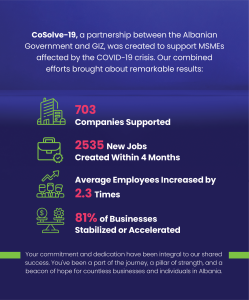
“Up to 81% of the businesses increased employment since participating in CoSolve-19, adding Up to 2535 persons newly employed 4 months after attending the CoSolve-19 initiative. More importantly, around 1560 women were employed”
The implementation journey of the CoSOLVE-19 Project was not without obstacles, yet concerted collaborative efforts steered the project towards triumph over these challenges. Notably distinctive was the project’s amalgamation, symbolizing a remarkable collaboration between two projects and three Albanian ministries: Finance and Economy, Tourism and Environment, and Agriculture and Rural Development. This partnership orchestrated a union of pivotal stakeholders from both the public and private sectors, laying the foundation for the project’s remarkable success. By uniting the expertise and resources of multiple ministries and initiatives, CoSOLVE-19 thrived as a testament to the power of unified, cross-sectoral collaboration in driving impactful change.
As we approach the end date of project implementation, what does the impact of the project look like today?
After almost three years of project implementation, the impact of the CoSolve-19 project is truly remarkable. Within just four months of CoSOLVE-19’s involvement, around 2,500 employees were either newly hired or rehired by the participating companies. This resulted in a substantial increase in employment for MSMEs, with an average growth rate of 2.3 times compared to pre-COVID times. On average, these companies saw their employee count rise from 2.77 to 6.37 employees.
What’s even more promising is that more than 80% of the participating companies have confirmed that they have either maintained or, in some cases, increased their number of employees since the inception of the CoSolve-19 project. These numbers not only indicate the project’s effectiveness but also its significant contribution to business resilience and job creation, especially in the face of ongoing challenges.
What can be said about the CoSOLVE-19 Success Stories?
One of the hallmarks of the CoSOLVE-19 Project is its ability to transform MSMEs and farms, and the impact figures speak for themselves. From its implementation in 2020 to the present day, the project has birthed numerous success stories, illustrating the resilience and adaptability of businesses in Albania. The stories are very diverse and each says for itself, but here is a noteworthy example:

Caravan Horse Riding / Kristina Fidhi
Kristina Fidhi, one of the founders and co-owners of “Caravan Horse Riding Albania” in Gjirokastër, says: “It was thanks to CoSolve-19, that it became possible for us to increase the standard of services in our riding center, through helping us purchase 10 sets of equipment for horses, which not only improved safety for horses and riders but further promoted the expansion of the sector with the creation of the riding school.”
With the implementation of their change plan and this new investment, Kristina started a partnership with the Polish company “Daw Mag” and will be able to offer customized riding products as subcontractors for the Albanian market. This new business line will be added as a service to their website, for the production of custom saddles. More importantly, the creation of the riding school employed an instructor and an assistant instructor who will educate a new generation of trail outdoor riders.
Coming to the end of this journey, how does CoSOLVE-19 plan to ensure the sustainability of the project’s efforts in the long term? Any plans for the future next phase?
In its forward-looking approach, the CoSOLVE-19 Project places a strong emphasis on the sustainability of its efforts over the long term. The project’s vision extends beyond its immediate impact on the businesses it has directly assisted, as it seeks to establish a lasting ripple effect. CoSOLVE-19 is dedicated to transitioning the project to capable entities, such as chambers and business associations, that can carry the torch of empowerment for small businesses in Albania, thus ensuring a legacy of support and resilience. As part of this transition, the trainers and coaches, who play a vital role in the project’s success, are organized under the Balance network and will continue to offer business advisory services for MSMEs. This strategic move ensures that the expertise and knowledge developed through CoSOLVE-19 are sustained and made available to small businesses, fostering their growth and resilience in the long term.
“The CoSOLVE-19 Project is more than just an initiative; it’s a lifeline for small and micro-businesses in Albania, a testament to the strength of collaboration, innovation, and the enduring spirit of entrepreneurship in the face of adversity.”
Though initially launched in response to the pressing needs arising from the Corona pandemic, CoSOLVE-19’s score mission remains steadfast: fostering the growth and resilience of small farmers and businesses. Importantly, the project does not foresee another phase, as it aspires to solidify its impact through sustainable handovers and collaborations, reinforcing its commitment to the long-term betterment of the Albanian business landscape.
